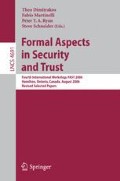Abstract
Anonymity is the property of maintaining secret the identity of users performing a certain action. Anonymity protocols often use random mechanisms which can be described probabilistically. In this paper, we propose a probabilistic process calculus to describe protocols for ensuring anonymity, and we use the notion of relative entropy from information theory to measure the degree of anonymity these protocols can guarantee. Furthermore, we prove that the operators in the probabilistic process calculus are non-expansive, with respect to this measuring method. We illustrate our approach by using the example of the Dining Cryptographers Problem.
Access this chapter
Tax calculation will be finalised at checkout
Purchases are for personal use only
Preview
Unable to display preview. Download preview PDF.
References
Baier, C., Kwiatkowaska, M.Z.: Domain equations for probabilistic processes. Mathematical Structures in Computer Science 10(6), 665–717 (2004)
Berthold, O., Pfiztmann, A., Standtke, R.: The disavantages of free mix routes and how to overcome them. In: Federrath, H. (ed.) Designing Privacy Enhancing Technologies. LNCS, vol. 2009, pp. 30–45. Springer, Heidelberg (2001)
Bhargava, M., Palamidessi, C.: Probabilistic anonymity. In: Abadi, M., de Alfaro, L. (eds.) CONCUR 2005. LNCS, vol. 3653, pp. 171–185. Springer, Heidelberg (2005)
Chatzikokolakis, K., Palamidessi, C., Panangaden, P.: Anonymity protocols as noisy channels. In: Proc. 2nd Symposium on Trustworthy Global Computing. LNCS, Springer, Heidelberg, 2006 (to appear)
Chaum, D.: The dining cryptographers problem: Unconditional sender and recipient untraceability. Journal of Cryptology 1, 65–75 (1988)
Deng, Y., Palamidessi, C., Pang, J.: Weak probabilistic anonymity. In: Proc. 3rd Workshop on Security Issues in Concurrency, ENTCS, 2006 (to appear)
Desharnais, J., Jagadeesan, R., Gupta, V., Panangaden, P.: The metric analogue of weak bisimulation for probabilistic processes. In: Proc. 17th IEEE Symposium on Logic in Computer Science, pp. 413–422. IEEE Computer Society, Los Alamitos (2002)
Desharnais, J., Jagadeesan, R., Gupta, V., Panangaden, P.: Metrics for labelled Markov processes. Theoretical Computer Science 318(3), 323–354 (2004)
Díaz, C., Seys, S., Claessens, J., Preneel, B.: Towards measuring anonymity. In: Dingledine, R., Syverson, P.F. (eds.) PET 2002. LNCS, vol. 2482, pp. 54–68. Springer, Heidelberg (2003)
Dingledine, R., Shmatikov, V., Syverson, P.F.: Synchronous batching: From cascades to free routes. In: Martin, D., Serjantov, A. (eds.) PET 2004. LNCS, vol. 3424, pp. 186–206. Springer, Heidelberg (2005)
Furuichi, S., Yanagi, K., Kuriyama, K.: Fundamental properties of Tsallis relative entropy. Journal of Mathematical Physics 45(12), 4868–4877 (2004)
Garcia, F.D., Hasuo, I., Pieters, W., van Rossum, P.: Provable anonymity. In: Proc.3rd ACM Workshop on Formal Methods in Security Engineering, pp. 63–72. ACM Press, New York (2005)
Halpern, J.Y., O’Neill, K.R.: Anonymity and information hiding in multiagent systems. In: Proc. 16th IEEE Computer Security Foundations Workshop. IEEE Computer Society, Los Alamitos (2003)
Hoare, C.A.R.: Communicating Sequential Processes. Prentice Hall, Englewood Cliffs (1985)
Hughes, D., Shmatikov, V.: Information hiding, anonymity and privacy: a modular approach. Journal of Computer Security 12(1), 3–36 (2004)
Kesdogan, D., Egner, J.: Stop-and-go MIXes: Providing probabilistic anonymity in an open system. In: Aucsmith, D. (ed.) IH 1998. LNCS, vol. 1525, pp. 83–98. Springer, Heidelberg (1998)
Kullback, S., Leibler, R.A.: On information and sufficiency. Annals of Mathematical Statistics 22(1), 79–86 (1951)
Kwiatkowska, M., Norman, G., Parker, D.: PRISM: Probabilistic symbolic model checker. In: Field, T., Harrison, P.G., Bradley, J., Harder, U. (eds.) TOOLS 2002. LNCS, vol. 2324, pp. 200–204. Springer, Heidelberg (2002)
Milner, R.: Communication and Concurrency. Prentice-Hall, Englewood Cliffs (1989)
Moskowitz, I.S., Newman, R.E., Crepeau, D.P., Miller, A.R.: Covert channels and anonymizing networks. In: Proceedings of 2nd ACM Workshop on Privacy in the Electronic Society, pp. 79–88. ACM Press, New York (2003)
Newman, R.E., Nalla, V.R., Moskowitz, I.S.: Anonymity and covert channels in simple timed mix-firewalls. In: Martin, D., Serjantov, A. (eds.) PET 2004. LNCS, vol. 3424, pp. 1–16. Springer, Heidelberg (2005)
Reiter, M.K., Rubin, A.D.: Crowds: Anonymity for Web transactions. ACM Transactions on Information and System Security 1(1), 66–92 (1998)
Schneider, S., Sidiropoulos, A.: CSP and anonymity. In: Martella, G., Kurth, H., Montolivo, E., Bertino, E. (eds.) Computer Security - ESORICS 1996. LNCS, vol. 1146, pp. 198–218. Springer, Heidelberg (1996)
Segala, R.: Modeling and Verification of Randomized Distributed Real-Time Systems. PhD thesis, MIT, Deptartment of EECS (1995)
Serjantov, A., Danezis, G.: Towards an information theoretic metric for anonymity. In: Dingledine, R., Syverson, P.F. (eds.) PET 2002. LNCS, vol. 2482, pp. 41–53. Springer, Heidelberg (2003)
Shmatikov, V.: Probabilistic model checking of an anonymity system. Journal of Computer Security 12(3/4), 355–377 (2004)
Syverson, P.F., Goldschlag, D.M., Reed, M.G.: Anonymous connections and onion routing. In: Proc. 18th IEEE Symposium on Security and Privacy, pp. 44–54. IEEE Computer Society Press, Los Alamitos (1997)
van der Meyden, R., Su, K.: Symbolic model checking the knowledge of the dining cryptographers. In: Proc. 17th IEEE Computer Security Foundations Workshop, pp. 280–291. IEEE Computer Society Press, Los Alamitos (2004)
Author information
Authors and Affiliations
Editor information
Rights and permissions
Copyright information
© 2007 Springer-Verlag Berlin Heidelberg
About this paper
Cite this paper
Deng, Y., Pang, J., Wu, P. (2007). Measuring Anonymity with Relative Entropy. In: Dimitrakos, T., Martinelli, F., Ryan, P.Y.A., Schneider, S. (eds) Formal Aspects in Security and Trust. FAST 2006. Lecture Notes in Computer Science, vol 4691. Springer, Berlin, Heidelberg. https://doi.org/10.1007/978-3-540-75227-1_5
Download citation
DOI: https://doi.org/10.1007/978-3-540-75227-1_5
Publisher Name: Springer, Berlin, Heidelberg
Print ISBN: 978-3-540-75226-4
Online ISBN: 978-3-540-75227-1
eBook Packages: Computer ScienceComputer Science (R0)

